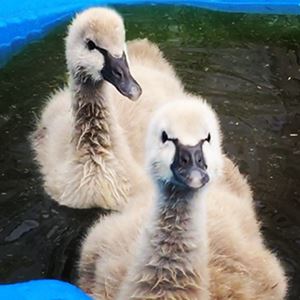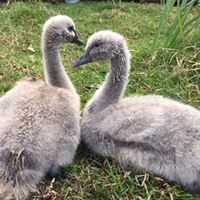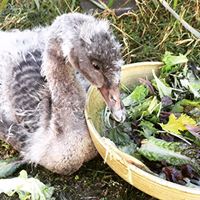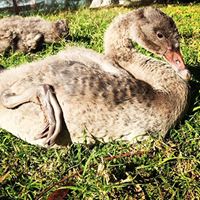Black Swan Cygnets
Tuesday, July 10, 2018

A local couple from Bawley Point on the mid-south coast called WIRES to report they had two young Black swan cygnets contained in a box.
Their house backs onto a swampy area near Cormorant Beach where the water can run out to the ocean during very heavy rains.
They had just witnessed a female Black swan walking out onto Cormorant Beach with 4 very young cygnets following behind. The cygnets were only 2-3 days old and very small.
As they watched the mother swan fled to the ocean (as adult swans can do), possibly spooked by several people and their dogs on the beach. The cygnets tried to follow but were unable to manage the ocean.
The concerned couple contained two of the stranded cygnets and went back home to call WIRES, while another concerned couple locked their dogs up and returned to help.
The other two cygnets were washed up on the beach and tragically witnessed a dog kill one of the young birds, the other cygnet fled over the sand dunes deep into a shrubby, swampy area backing onto private properties.
WIRES rescuer, Zora went out to collect the two rescued cygnets and searched the beach, dunes, and area of the last sighting for the third cygnet, but found neither the mother swan nor the missing baby.
The following night a friend called to report having found a swan cygnet. The three were immediately reunited, but the third cygnet was considerably smaller and weaker, and despite our best efforts it died after 5 days.
The original two cygnets are now almost 9 weeks old and have grown at a phenomenal rate from 125 grams to over 3kg in that time!
They consume huge volumes of greens, and as you can see, they change rapidly. Every single day there are new feathers and visible changes in appearance.



The cygnets will need to be in care until they can fly, which is anywhere between 5-7 months. They are housed in a large enclosure with overhead protection from predators and several ponds for swimming.
Please always practice responsible pet ownership. If you are walking in an area where wildlife is likely to be present keep your dog on a leash and always keep your cats contained. These steps will help minimize harm to wildlife. Read more
Recent Posts
WIRES launches its first wildlife rehabilitation centre - Mullyang
WIRES Emergency Response in the wake of ex-tropical cyclone Alfred
International Women’s Day Volunteer Spotlight: Shelley
Tropical Cyclone Alfred – Emergency Wildlife Advice
Interview with WIRES Training and Development
Celebrating Women in Science: The Journey of Holly, Wildlife Conservationist and WIRES Team Member
